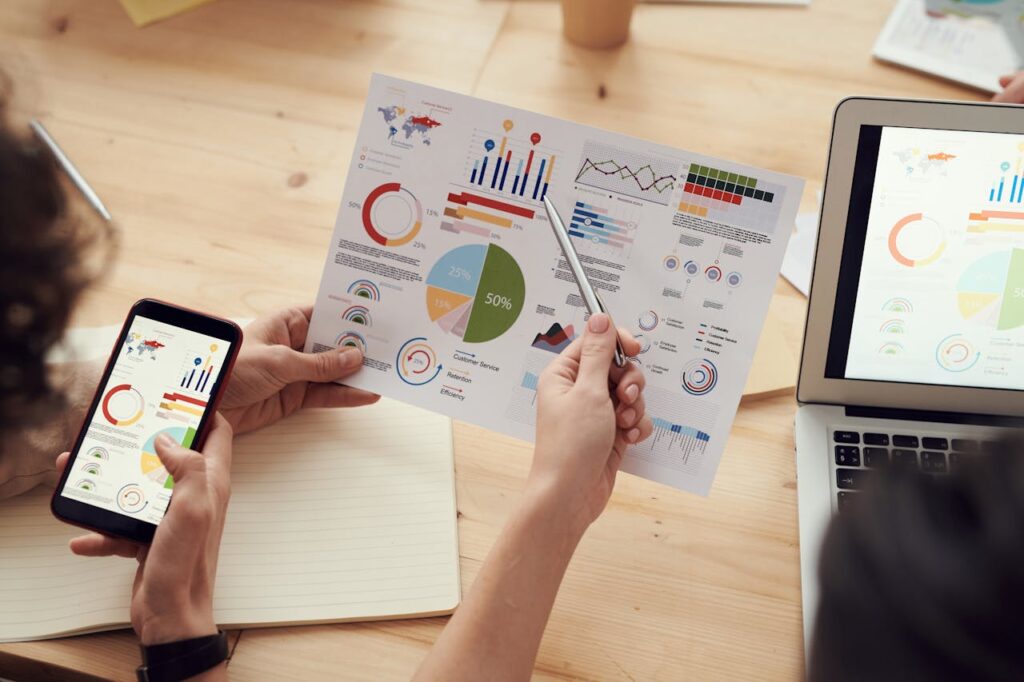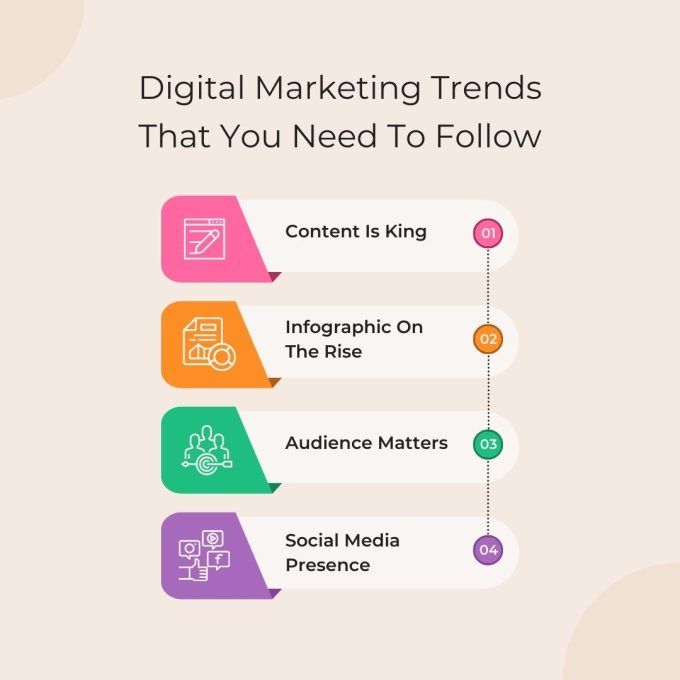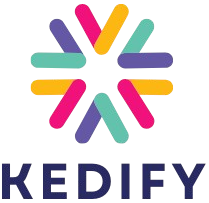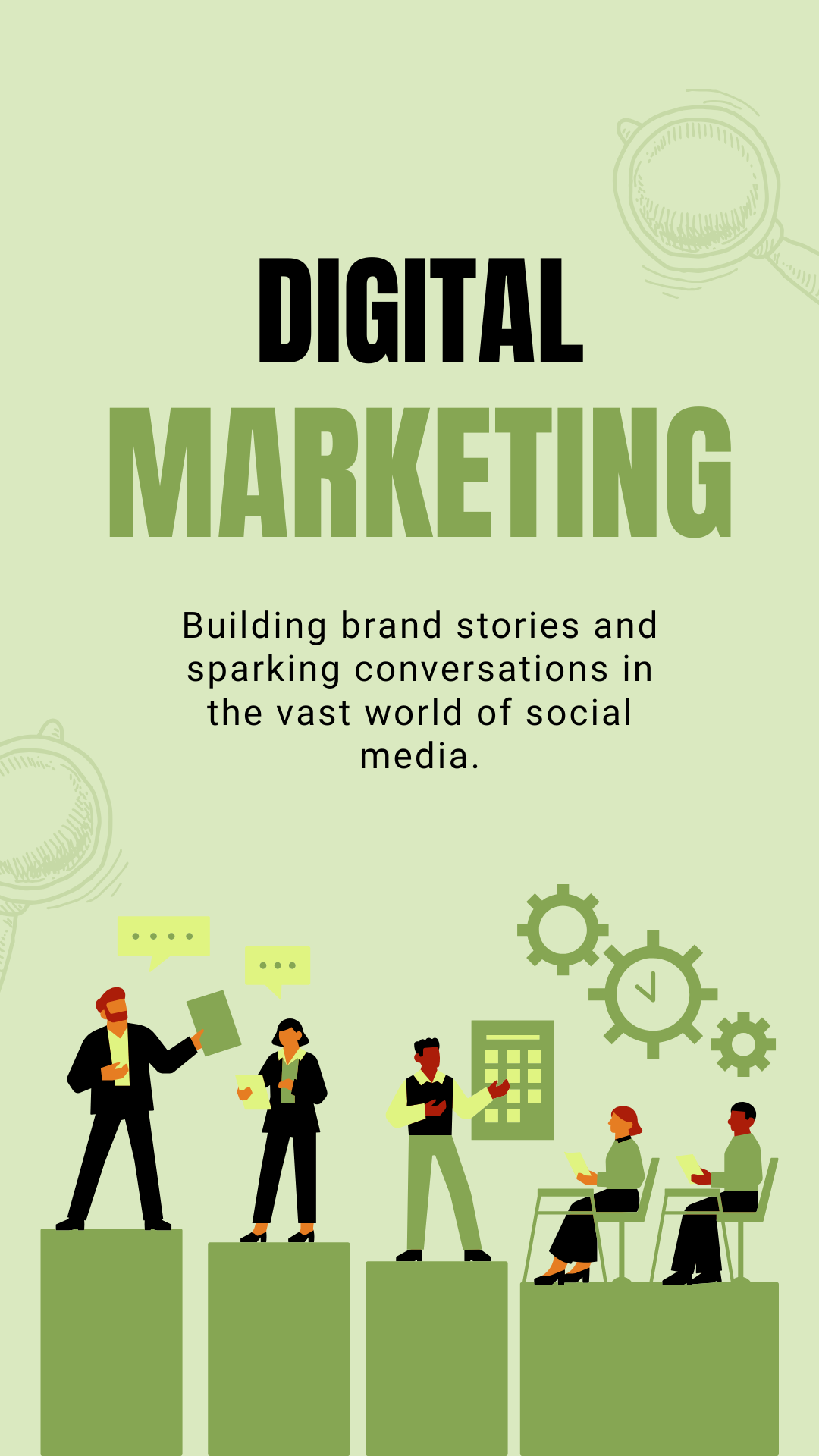The Future of Digital Marketing: A Look Ahead to 2025 and Beyond
Over the past ten years, digital marketing has advanced quickly, changing how companies interact with their clientele. Marketing techniques have changed to adapt to new technology and consumer habits, from the emergence of social media platforms to the advent of machine learning and artificial intelligence (AI). As 2025 and beyond approach, the future of digital marketing appears to be even more fascinating.
In this blog, we will dive deep into the Future of Digital Marketing, exploring Emerging Digital Marketing Trends, Digital Marketing in 2025, the role of Artificial Intelligence in Marketing, Data-Driven Marketing Strategies, Social Media Marketing Trends 2025, and more. Let’s look at what’s to come and how these innovations will shape marketing strategies in the coming years.
The Evolution of Digital Marketing
Before we look ahead, it’s important to understand how digital marketing has evolved. The internet, smartphones, and social media platforms have drastically changed the marketing landscape over the past few years. Early online marketing efforts were focused on display ads and banner ads. However, the Evolution of Online Marketing has led to more sophisticated methods such as search engine optimization (SEO), pay-per-click (PPC) advertising, and content marketing.
In recent years, Data-Driven Marketing Strategies have become a cornerstone of successful campaigns. Marketers have shifted focus from just broad audience targeting to more personalized experiences using data insights. Now, technologies like Artificial Intelligence in Marketing are taking marketing efforts to the next level, enabling automation and predictive analysis.
The Future of Digital Marketing in 2025 and Beyond
As we enter 2025, digital marketing will continue to evolve. The ongoing advancements in AI, machine learning, automation, and personalization will drastically influence how businesses approach their marketing efforts. Here’s what we can expect:
The Impact of AI on Digital Advertising

One of the most significant forces shaping the Future of Digital Marketing is Artificial Intelligence in Marketing. AI is already making its mark in digital advertising through automation, customer insights, and personalized experiences. By 2025, AI will likely have a more integrated role in campaign creation, analysis, and optimization.
AI-powered tools can analyze vast amounts of customer data to deliver personalized ads in real time. For instance, AI can predict which ads are most likely to convert based on customer behavior and preferences, significantly improving ad targeting and reducing wasted ad spend. Additionally, AI can automate customer service through chatbots, ensuring 24/7 engagement and improving the overall customer experience.
The Impact of AI on Digital Advertising will lead to more efficient and effective campaigns, with companies able to respond to customer needs faster and with greater accuracy. From predictive analytics to automated content creation, AI will play a critical role in shaping the future of online marketing.
Personalization in Digital Marketing has become a buzzword, but in 2025, it will go far beyond dynamic website content and targeted emails. Today’s consumers expect highly personalized experiences—whether they’re shopping for products, engaging with a brand on social media, or consuming content. Businesses that fail to meet these expectations risk losing out on customer loyalty and sales.
With the help of AI, machine learning, and big data, brands will be able to deliver personalized content tailored to each user’s preferences and behaviors in real-time. Personalized recommendations based on past purchases, browsing history, and demographic information will become the norm across all digital channels. This Personalization in Digital Marketing will be pivotal in improving conversion rates, customer satisfaction, and loyalty.
Personalization in Digital Marketing
Emerging Digital Marketing Trends: Video and Voice Search
In 2025, video content will become even more dominant in marketing strategies. Video has already proven to be an effective medium for engagement, but by 2025, its role will be even more significant. From product tutorials to customer testimonials and live streaming, video will be a primary tool for engaging with consumers.
Moreover, voice search will continue to grow as an Emerging Digital Marketing Trend. With the increasing popularity of voice-activated assistants like Siri, Alexa, and Google Assistant, more people are using voice search to find information online. This shift means marketers will need to optimize their content for voice search by focusing on conversational keywords and ensuring that their websites are voice search-friendly.
Social media platforms have always been a critical part of digital marketing, and by 2025, they will be even more influential. The rise of new platforms, such as TikTok, alongside the ongoing evolution of older platforms like Instagram, Facebook, and LinkedIn, will continue to shape the Social Media Marketing Trends 2025.
In the coming years, social commerce will rise to new heights. Social media platforms will allow consumers to purchase products directly from their feeds, without leaving the app. Social shopping will become a seamless experience, and businesses will be able to engage with customers in ways that feel natural and integrated into their social media experience.
Additionally, the growing use of augmented reality (AR) and virtual reality (VR) on social media platforms will offer new opportunities for interactive marketing. Consumers will be able to “try before they buy” using AR filters, while VR could provide immersive brand experiences.
Social Media Marketing Trends 2025
Data-Driven Marketing Strategies

The Future of Digital Marketing will rely heavily on Data-Driven Marketing Strategies. The increasing availability of data—whether from customer behavior, social media engagement, or website interactions—provides marketers with the tools to create highly targeted and efficient campaigns. By 2025, data will be even more sophisticated, enabling marketers to predict customer behavior and personalize marketing efforts on a more granular level.
Marketers will increasingly rely on advanced analytics to measure the effectiveness of campaigns and make real-time adjustments. Predictive analytics will help businesses forecast future trends and consumer behavior, allowing for proactive decision-making. The use of data will empower businesses to make smarter decisions, improve ROI, and deliver more relevant messages to their audience.
Blockchain, known for its association with cryptocurrency, is expected to play a significant role in digital marketing by 2025. It will provide increased transparency in digital advertising by allowing businesses to track every stage of an ad’s journey—from creation to delivery. This will help to reduce fraud and ensure that advertisers’ money is being spent effectively.
Blockchain’s decentralized nature will also allow for more secure transactions, data privacy, and improved trust between brands and consumers. Marketers will be able to use blockchain to ensure that their ads are reaching the intended audience and that data privacy concerns are addressed.
The Role of Blockchain in Digital Marketing
Upcoming Digital Marketing Technologies
The Future of Digital Marketing will be influenced by various Upcoming Digital Marketing Technologies. Virtual Reality (VR) and Augmented Reality (AR) will provide immersive experiences that take customer engagement to a new level. Companies like IKEA and Nike are already using AR to allow customers to visualize products in their homes before making a purchase.
Another technology on the horizon is 5G. The implementation of 5G technology will drastically improve internet speed and reliability, making mobile experiences faster and more responsive. Marketers will be able to deliver richer content, such as 4K video and interactive ads, to users without delays. This advancement will open up new possibilities for mobile marketing, mobile commerce, and location-based services.
With the increasing adoption of voice assistants and chatbots, voice search and conversational marketing will gain prominence. By 2025, conversational AI, such as chatbots and voice assistants, will become more advanced and capable of holding natural conversations with customers.
Conversational marketing enables real-time interactions with customers, answering their queries, and helping them with their buying decisions instantly. As technology improves, these interactions will become more seamless, creating a smoother and more personalized customer journey.
Voice and Conversational Marketing
The Importance of Sustainability in Digital Marketing
Consumers are becoming more environmentally conscious, and sustainability is emerging as a core value in the purchasing decisions of many customers. By 2025, businesses will need to demonstrate their commitment to sustainability not just through their products but also in their marketing practices.
Brands that prioritize sustainability in their messaging will resonate more with eco-conscious consumers. Digital marketing campaigns will incorporate sustainability as a key theme, promoting eco-friendly products and practices through green marketing strategies.
By focusing on the Future of Digital Marketing, Emerging Digital Marketing Trends, and technologies such as Artificial Intelligence in Marketing and Data-Driven Marketing Strategies, businesses can position themselves for success in Digital Marketing in 2025 and beyond. Understanding and leveraging these innovations will ensure that your brand stays competitive and resonates with the evolving needs of consumers.

Step-by-Step Guide: How to Become a Digital Marketer
The digital marketing industry is growing rapidly, and with the increasing reliance on online platforms for business, it’s an exciting career path. Future of Digital Marketing holds immense potential as businesses continue to adapt to Emerging Digital Marketing Trends. Becoming a digital marketer may seem overwhelming at first, but with the right approach and dedication, anyone can learn the skills needed to excel in this field. Below is a step-by-step guide to help you understand the process in simple terms.
Step 1: Understand What Digital Marketing Is
Before diving into the field, it’s essential to understand what digital marketing involves. Digital marketing refers to promoting products, services, or brands using online channels such as search engines, social media, email, websites, and mobile apps.
The main areas of digital marketing include:
- Search Engine Optimization (SEO): Optimizing websites to rank higher in search engine results.
- Social Media Marketing: Promoting content and engaging with audiences on platforms like Instagram, Facebook, and LinkedIn. Social Media Marketing Trends 2025 are expected to further revolutionize how brands connect with users.
- Content Marketing: Creating valuable content like blogs, videos, and infographics to attract and retain customers.
- Pay-Per-Click (PPC) Advertising: Running paid ads on search engines or social media platforms.
- Email Marketing: Communicating with customers through emails to nurture leads and boost sales.
- Analytics: Using tools to track and analyze marketing performance, vital for Data-Driven Marketing Strategies.
Step 2: Learn the Basics of Digital Marketing
Once you know what digital marketing is, start by learning the basics. You can begin by reading blogs, watching tutorials, or enrolling in free online courses. Websites like Google Digital Garage, HubSpot Academy, and Coursera offer beginner-friendly courses.
Incorporating Artificial Intelligence in Marketing into your learning will also keep you ahead of the curve.
Key Topics to Focus On:
- Basics of SEO and how search engines work.
- Introduction to Google Ads and PPC advertising.
- How social media platforms operate for businesses.
- The importance of email marketing and tools like Mailchimp.
- Basics of website design and user experience (UX).
Step 3: Choose Your Specialization
Digital marketing is a vast field. While it’s good to understand all aspects, specializing in one area can help you stand out.
Take time to explore different areas and choose what excites you the most.
For example:
- If you enjoy writing and storytelling, you can focus on Content Marketing.
- If you are analytical and enjoy numbers, SEO or PPC might be ideal.
- If you love interacting with people and building communities, consider Social Media Marketing.
Step 4: Learn the Tools of the Trade
Every digital marketer needs to know how to use certain tools to succeed.
As Upcoming Digital Marketing Technologies emerge, staying adaptable to new tools will be essential.
Here are some must-know tools and platforms:
- Google Analytics – For tracking website traffic and understanding user behavior.
- Google Ads – For running PPC campaigns.
- SEMrush or Ahrefs – For SEO analysis and keyword research.
- Hootsuite or Buffer – For managing social media accounts.
- Canva – For creating graphics and designs.
- WordPress – For managing and creating websites.
- Email Marketing Platforms – Like Mailchimp or Constant Contact.
Step 5: Build Your Digital Marketing Skills
To excel in digital marketing, you need a mix of technical and soft skills.
Technical Skills:
- Practice SEO: Try optimizing a blog or website for search engines.
- Run an Ad Campaign: Use Google Ads or Facebook Ads Manager to set up a mock campaign.
- Social Media Management: Create and manage a social media page for a hobby or project.
- Content Creation: Write blog posts, create videos, or design social media posts.
Soft Skills:
- Communication Skills: Learn how to write compelling copy for ads and emails.
- Creativity: Experiment with new ideas and approaches in your campaigns.
- Analytical Thinking: Practice interpreting data to understand what works and what doesn’t.
- Adaptability: Stay updated with Digital Marketing in 2025 and beyond.
Step 6: Gain Practical Experience
Theoretical knowledge is essential, but hands-on experience is what truly matters in digital marketing.
Here’s how you can gain it:
- Start a Blog or Website: Practice SEO, content marketing, and analytics.
- Volunteer for Small Businesses: Help with their social media or digital campaigns.
- Freelance: Join platforms like Fiverr, Upwork, or Freelancer.
- Internships: Work with marketing agencies or companies to gain real-world experience.
Step 7: Get Certified
Certifications can boost your credibility and make your resume stand out.
These credentials demonstrate your knowledge and commitment to the Evolution of Online Marketing.
Some popular options include:
- Google Ads Certification
- HubSpot Inbound Marketing Certification
- Facebook Blueprint Certification
- SEMrush SEO Toolkit Certification
Step 8: Build a Strong Portfolio
Focus on projects that highlight your creativity and proficiency in Personalization in Digital Marketing.
Your portfolio should showcase:
- Blog posts or articles you’ve written.
- Social media campaigns you’ve managed.
- Results from ad campaigns you’ve run (e.g., click-through rates or ROI).
Step 9: Stay Updated with Trends
Impact of AI on Digital Advertising and other technological advancements make digital marketing a constantly evolving field.
To stay relevant:
- Follow blogs like Neil Patel, Moz, and Social Media Examiner.
- Join communities on LinkedIn or Facebook.
- Attend webinars and conferences.
Step 10: Apply for Jobs or Start Freelancing
Roles like Digital Marketing Executive, Social Media Manager, SEO Specialist, or PPC Analyst await. Freelancers can use platforms or network locally for opportunities.
Step 11: Measure and Improve
Use Data-Driven Marketing Strategies and tools like Google Analytics to refine your campaigns continuously. The better your strategies, the more impactful your results will be.
Summary
The future of digital marketing is evolving rapidly, with 2025 bringing significant advancements and strategies. Artificial intelligence in marketing will be transformative, enabling smarter automation and better personalization. Data-driven marketing strategies will allow businesses to design campaigns with unmatched precision, leveraging valuable insights.
The evolution of online marketing will embrace emerging digital marketing trends like voice search optimization, augmented reality, and interactive content, offering innovative ways to engage customers. Social media marketing trends 2025 will likely emphasize short, engaging videos and immersive experiences to match changing consumer preferences.
New developments in upcoming digital marketing technologies, such as blockchain and 5G, will revolutionize the industry, enhancing connectivity and data security. Personalization will remain a top priority, making personalization in digital marketing a crucial focus for delivering meaningful customer experiences.
By adapting to these shifts and leveraging the impact of AI on digital advertising, businesses can remain competitive in the dynamic landscape of digital marketing in 2025.
FAQ's
In 2025, trends like AI-driven ads, personalized marketing, and voice or visual search will play a big role in reaching customers.
Social media will remain key, with new platforms emerging and more focus on short videos, live streams, and influencer collaborations.
AI will help create better-targeted ads, analyze customer behavior, and automate tasks like chatbots or email campaigns.
Yes, email marketing will stay important, especially when it’s personalized and provides value to the audience.
By focusing on local SEO, building a strong social media presence, and using cost-effective tools like AI to connect with customers.
Content marketing will focus on interactive, engaging formats like videos, quizzes, and personalized stories to attract audiences.
Customers will expect fast, personalized experiences and prefer brands that align with their values, like sustainability or social responsibility.

